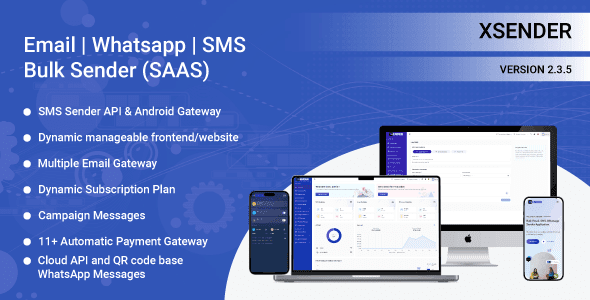200
Here’s what I found out about XSender 2.3.5 – Bulk Email, SMS and WhatsApp Messaging Application, plus some considerations, warnings, and alternatives. If you want help figuring out whether to use it (or something else), I can also compare pros/cons.
✅ What It Does / Features
Based on available sources, here are the main features/functions:
- Web app built with Laravel for sending bulk emails (SMTP, PHPMailer, SendGrid API). DoniaWeB+2CodeCanyon+2
- Mass SMS messaging via 2 methods:
- An Android app that uses a SIM card(s) in a device to send SMS. It supports dual SIM. DoniaWeB+1
- Through SMS API Gateways (3rd party providers). DoniaWeB+1
- WhatsApp messaging bulk campaigns; can send to many people from groups or via uploaded contacts (CSV, Excel, etc.). DoniaWeB
- Contact management: store groups, upload contact lists, manage via .csv/.txt/excel. DoniaWeB+1
- Dual SIM Android support in Android SMS app to speed up sending. DoniaWeB
- White-label solution, meaning you can brand it/customize the front-end. WeaDown
⚠️ Legal, Ethical & Practical Issues
There are some big warnings to be aware of:
- Legitimacy & Licensing
- The official version is sold on CodeCanyon. Using illegal/nulled or unlicensed copies is risky (legal issues, no updates, vulnerabilities). CodeCanyon+1
- Some sites offering “free” or cracked versions often demand license codes, or have broken features. WeaDown+1
- Spam and Compliance
- Bulk messaging (especially SMS/WhatsApp/email) is heavily regulated in many countries. Without consent, sending promotional messages can violate privacy laws or terms of service.
- WhatsApp in particular has strict rules about using its Business / Cloud API for bulk messages. If you try to send mass messages via unofficial means, you risk account bans.
- Reliability & Deliverability
- Using SIM-based Android SMS gateways can lead to issues (carrier limits, message blocks).
- Emails sent from self-hosted or low reputation servers (without proper setup: SPF, DKIM, DMARC) often get filtered to spam.
- WhatsApp automated messaging outside the API or using “unofficial” methods tends to be unreliable and risky.
- Security
- If using cracked software, there may be backdoors, insecure code.
- Data of contacts must be protected (storage, encryption, access control) especially under laws like GDPR etc.
🔍 Version 2.3.5 Specifics
- The version you asked about (v2.3.5) is an older one. Some sources say v2.3.5 has already been “nulled” (i.e. unauthorized version) in rogue distribution sites. DoniaWeB+1
- It presumably has fewer features/newer fixes than more recent releases. If using that version, you may miss bugfixes, improvements.
💡 Alternatives & Best Practices
If you are considering using something like XSender, here are safer or better-managed alternatives / things to do:
- Use reputable email/SMS/WhatsApp marketing platforms (Mailchimp, SendGrid, Twilio, etc.) which comply with rules and have good deliverability.
- If Whatsapp messaging is needed, use official Business API / Cloud API so you stay compliant.
- Always gather explicit consent from users/contacts before sending bulk promotions.
- Regularly validate your contact lists to avoid bounces and deliverability issues.
- If you need similar functionality but want to avoid risks, maybe self-host an open-source solution and make sure to keep security, compliance in mind.
If you want, I can check whether there’s a safe license-legit version of XSender that works well, with cost, or I can suggest a list of comparable tools (legit) with pricing. Do you want me to pull that together?
